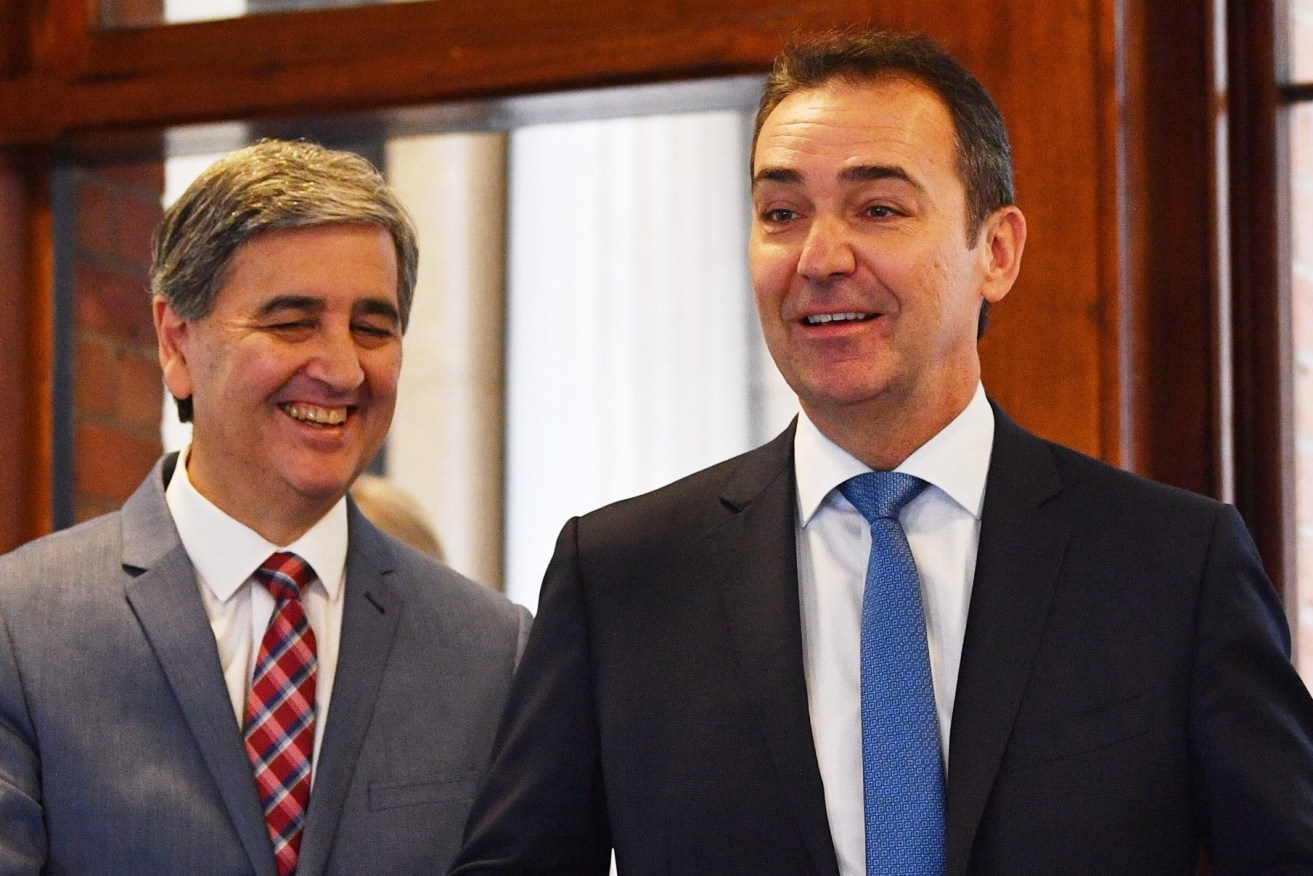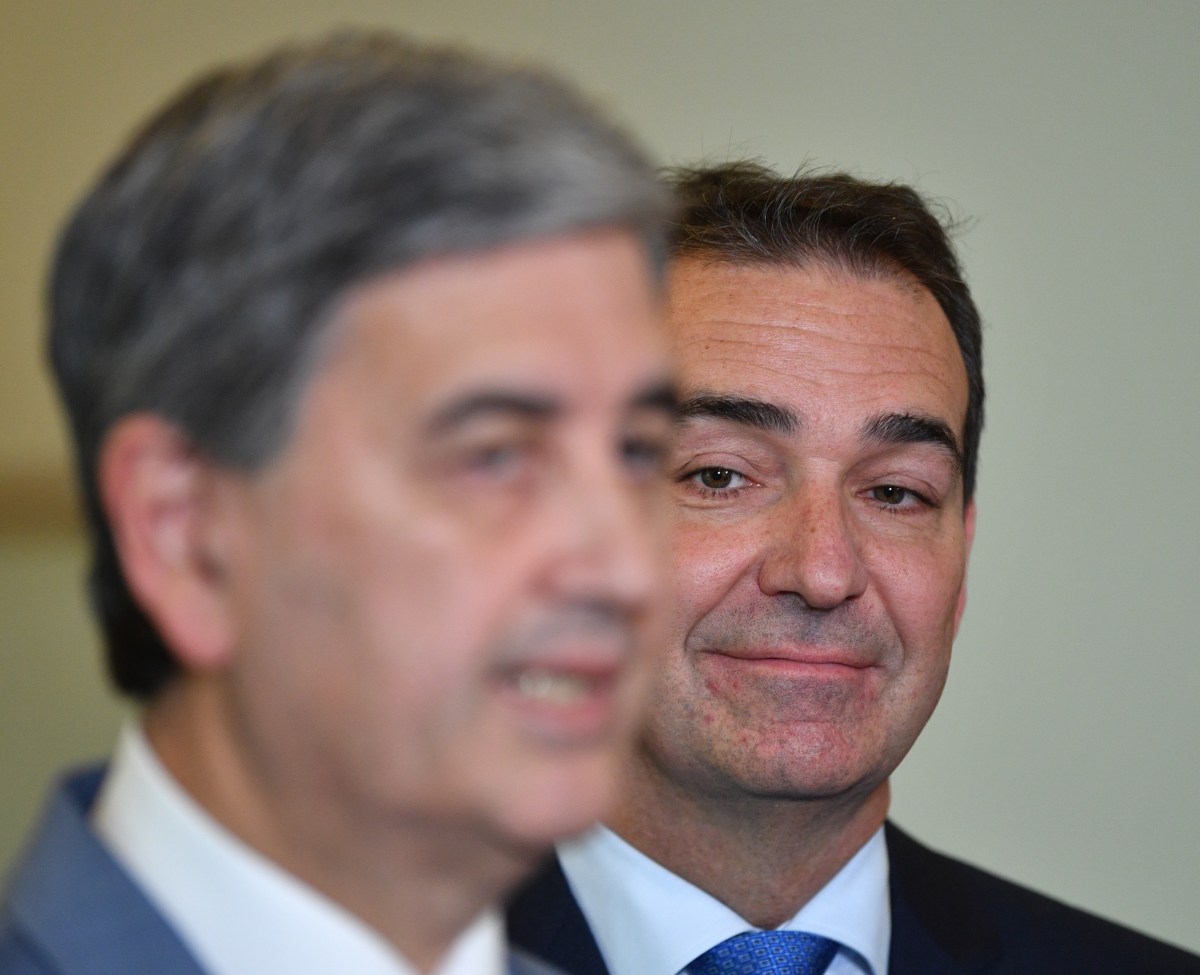Creative accounting helps ESL savings across the line
The Marshall Government will use general revenue – rather than its emergency services fund – to pay for election commitments to boost funding to the CFS and equip surf lifesaving clubs with drones, in order to meet its pledge to slash average household ESL bills by half.

Steven Marshall and Rob Lucas have announced their ESL savings plan. Photo: David Mariuz / AAP
As InDaily forecast this week, Premier Steven Marshall today confirmed his long-held pledge to impose a $90 million government remission on the Emergency Services Levy would be “delivered in full” from July 1.
“This translates to a 50 per cent reduction on the median house price ESL bill here in SA,” he told reporters.
The median price is valued at $470,000.
But Treasurer Rob Lucas confirmed the saving won’t bring household bills back to the level they were when Labor first scrapped the remission in 2014, when his predecessor Tom Koutsantonis removed what was effectively a 50 per cent rebate that at the time returned around $90 million to government coffers.
However, there have been incremental increases in all but one of the intervening years, meaning the Liberals’ promised $90 million annual remission doesn’t equate to the same dollar value as it did when it was first made.
The pre-election pitch promised the average household would save $150 a year, which was later replaced by a commitment to cut bills by 50 per cent. In the event, Lucas has fallen just shy of the former but just exceeded the latter, boasting that an average household will save $144.85 this year, or just over 50 per cent.
He lamented that a “significant rundown in the cash reserves” of the ESL fund in the past year, combined with new enterprise bargaining agreements across the sector, would mean “there’ll actually be an increase in expenditure”.
“$318 million will be spent on emergency services and programs… last year it was 302 million,” he confirmed.
He indicated it required some creative accounting to rein in the emergency services budget, conceding: “We’ve actually funded two of our specific emergency services promises – a $5 million spend on CFS stations and a rollout of drone technology – outside emergency services.”
“The mechanism we used was to take two of our promises outside the funding envelope, and we’re funding that separately,” he said.
“We’ve had to take $5 million out of the [overall] ESL bill… the reason being if you put it in there it was going to make it even harder to deliver on the promise in terms of the reduction in ESL bills.”
Lucas denied the $145 annual saving fell short of the pre-election commitment, arguing it was, in fact, a $164.65 annual saving “when compared to what would have paid under a re-elected Labor Government”.
“The people of SA want to see savings on their bills… I don’t think anyone’s going to give much credibility to an argument of a difference between $145 and $150,” he said.
“The reality is we made two claims – the other claim we made was to reduce it by 50 per cent and we’ve more than met that commitment.”
He said there was never a promise to return bills to their 2014 level, rather “our commitment was to take out $90 million in terms of ESL bills, and to deliver an average saving, and we’ve absolutely done that”.
“That’s why we talked in the end not about absolute numbers, but about 50 per cent on the average household – and that was the commitment of all the television advertising during the campaign,” he said.
“Because things move on in terms of expenditure, it became more and more difficult to be specific about the absolute dollar [figure].”
But he conceded bills would likely increase “incrementally” over the Government’s first term.
“We’ve locked in $90 million… there have been incremental increases in the ESL expenditure over a period of time, and you’d expect that to occur,” he said.
“The amount is fixed at $90 million, it’s not a percentage [so] as you incrementally increase your expenditure, there’ll be an incremental increase in ESL bills.
“We said that all along – it was a clear commitment… we made no commitment in relation to indexation.”
The ESL report will now be submitted to the Government-controlled Economic and Finance Committee for assessment, with Lucas noting that “the bulk of the concession is being delivered to metropolitan residential” homeowners.

Photo: David Mariuz / AAP
Shadow Treasurer Stephen Mullighan said he “welcomed” bill relief for householders, but argued it was a “clear broken election commitment” to “return the emergency services levy to its previous level”.
He said SA would be “swimming in extra GST revenue next financial year” and that should have been used to fund the shortfall.
He said households in regional Australia would “miss out the most”.
Asked whether it was hypocritical to criticise the Government for rolling back a bill spike the former Labor administration imposed, Mullighan said: “Our job as the Opposition is to hold this Government to account and make sure they deliver on the commitments they made.”




